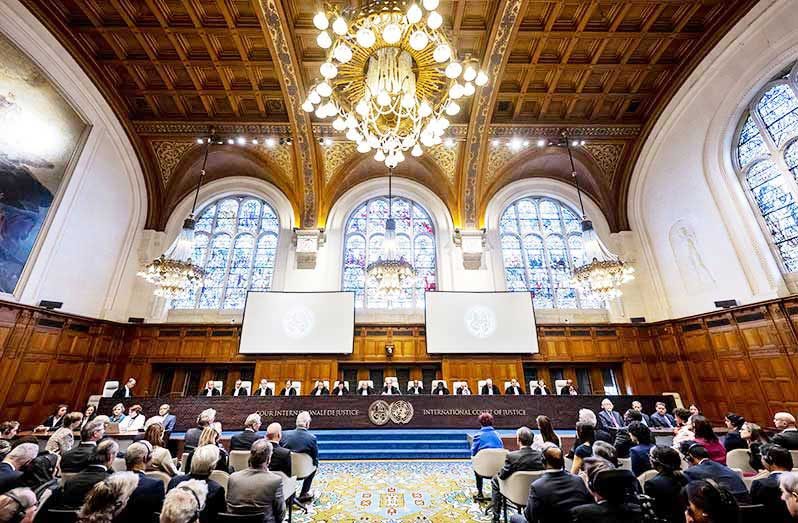GUYANA, on Monday, submitted its final written brief to the International Court of Justice (ICJ) in the ongoing border controversy with Bolivarian Republic of Venezuela over Guyana’s Essequibo region.
The submission, titled “Guyana’s Reply to Venezuela’s Counter-Memorial,” was personally delivered to the Court by Guyana’s Ambassador to Brussels, Sasenarine Singh, marking a critical step in the case that has been ongoing for over six years.
After Guyana’s submission, Venezuela will have the opportunity to file its rejoinder by August 2025, responding to Guyana’s reply.
Once both sides have submitted their written pleadings, the Court will schedule oral hearings.
Guyana remains optimistic that the ICJ will rule in its favour, reinforcing the validity of the 1899 Arbitral Award and confirming that the boundary established therein remains the definitive border between the two countries.
The controversy surfaced some six decades after the 1899 Arbitral Award, which established the boundary between British Guiana (now Guyana) and Venezuela.

Guyana seeks confirmation from the ICJ that the Award remains valid under international law and should be upheld as the legal boundary between the two nations.
Venezuela, which initially accepted the Award for more than six decades ago, reversed its position in the years before Guyana’s independence in 1966, asserting a claim to the Essequibo region, which accounts for two-thirds of Guyana’s territory and is rich in natural resources.
In 1966, the governments of the United Kingdom, British Guiana, and Venezuela signed the Geneva Agreement, aiming to resolve the matter through diplomacy.
But despite numerous attempts over the subsequent years, the controversy remained unresolved, prompting Guyana to refer the matter to the United Nations (UN) in 2018. The UN Secretary-General chose the ICJ as the forum to settle the matter definitively.
The case has moved through several stages since its initiation in 2018, with Venezuela filing multiple objections to the ICJ’s jurisdiction.
However, in both 2019 and 2022, the Court rejected these objections, affirming its jurisdiction over the case. Now, the Court is examining the merits of the controversy.
In its final written brief, Guyana responded to Venezuela’s Counter-Memorial, which was filed earlier in April 2024. Guyana’s legal team argues that the Arbitral Award is legally binding and should be upheld.
The Government of Guyana expressed confidence that the ICJ would dismiss Venezuela’s challenge to the Award and reaffirm the validity of the boundary established by the 1899 tribunal.
“…Venezuela’s challenges to the Arbitral Award and the international boundary, as set forth in its Counter-Memorial, are entirely without merit, and that the Court will ultimately confirm the validity, finality and legally binding nature of both the Award and the boundary,” the Government of Guyana said in a release on Monday.
In response to Venezuela’s threat to seize the Essequibo region, Guyana had previously requested the ICJ to issue provisional measures.
In December 2023, the Court responded by ordering both countries to refrain from actions that could disturb Guyana’s control over the Essequibo region until the case is concluded.
The controversy is not only a matter between Guyana and Venezuela but has wider implications for the region and international law.
The Essequibo region is rich in oil and gas resources, and the outcome of the case could have significant economic consequences.
As a result, Guyana has garnered substantial international support in its efforts to uphold the 1899 Award.
Guyana has also received diplomatic backing from several countries, highlighting concerns over Venezuela’s actions and its continued military presence near the border.
One year ago, the two countries signed the Argyle Declaration, reaffirming their commitment to peace and stability in the region, despite the ongoing controversy.
Despite these diplomatic efforts, Venezuela has continued to take steps that raise concerns over the potential for conflict.
In addition to its military presence, Venezuela passed the “Organic Law for the Defense of Guayana Esequiba,” further entrenching its claims to Guyana’s Essequibo territory.
Guyana, however, remains resolute in its stance that the boundary is settled under international law and will continue to pursue the case in the ICJ.



.jpg)











